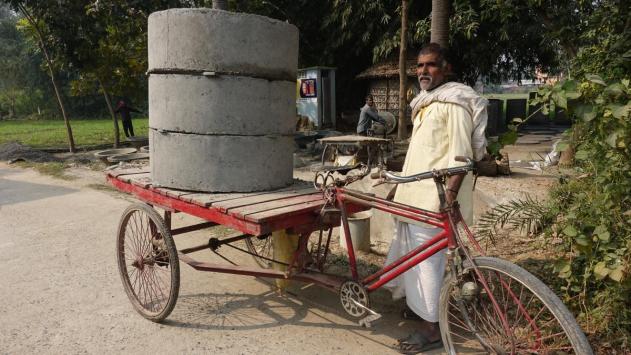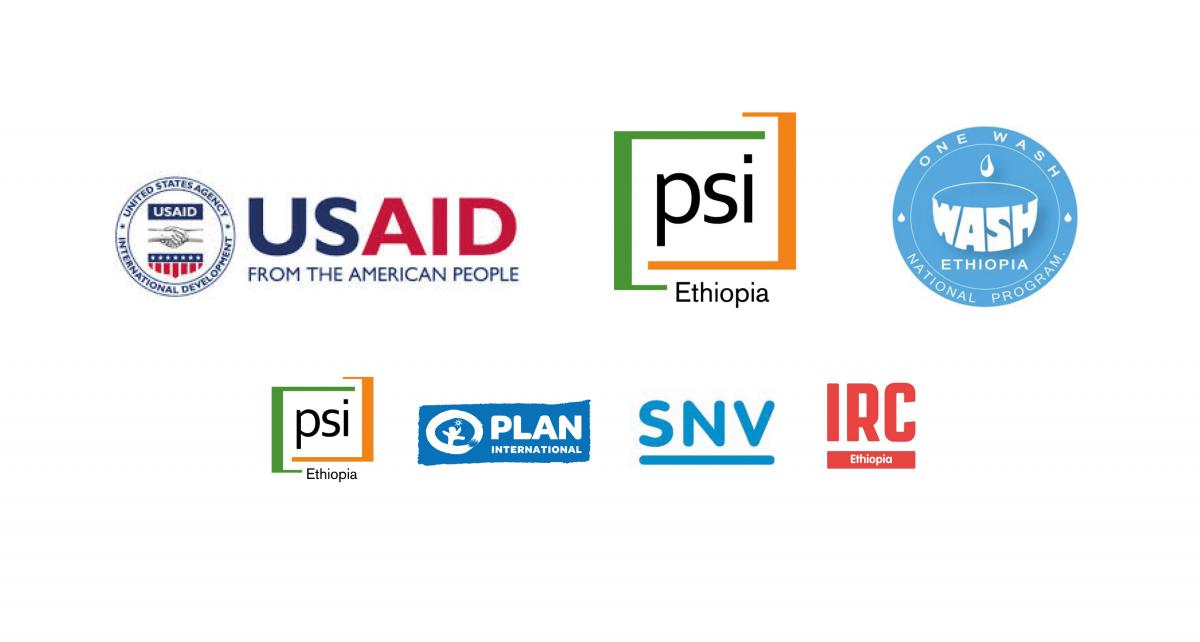You may have heard of the Lord of the Rings, but in Bihar, India, that name is taking on a whole new meaning. I recently joined a field visit to this part of the world to see how cement ring businesses are changing the face of rural sanitation.
Published on: 13/12/2017
A team from the USAID Transform WASH and USAID Growth through Nutrition (GtN) projects and their government partners travelled to Bihar state in India recently for a learning visit on sanitation marketing business. Our visit was hosted by PSI India, and their Supporting Sustainable Sanitation Improvements (3SI) project, which was launched in 2012 with funding from Bill and Melinda Gates Foundation. This aims to create sustainable business models to increase the supply of sanitation services by the private sector and at the same time build demand.
Before taking its current shape, the project tried out different business models and approaches to build supply chains. Now, four and a half years in, the project mainly focuses on the Cement Ring Manufacture Plus (CRM+) model to support toilet building in 19 districts of Bihar.
The core component of this business is the supply of cement rings to line toilet pits. The + refers to the linkages the project facilitates between other value chain players, including trained masons and micro finance institutions. To create demand, PSI employs Sanitation Solution Providers and Toilet Motivators who conduct community meetings and door-to-door visits. They build awareness and create demand for the products and services and also link households to enterprises.
To ensure sustainability, the 3SI project encourages households to use twin pits. Mr. Bikas Sinha, Programs Manager at PSI, told us that they encourage households to have two 5 feet pits rather than the traditional 15-16 feet deep single pit. The 5 feet pits can serve on average from 5 to 6 years. When the first pit gets full, households can shift to use the other pit. In the meantime, after a year the first pit can be cleaned as the waste dries. Cleaning can be done by any laborer and the sludge can be used as manure.We had the opportunity to visit two intervention districts, Smastipur and Begusarai. In Smastipur, we met Ramsurat Paswan who is the owner of Sweety Plant Udyog. Ramsurat used to work selling life insurance in Delhi. But, in 2012 he returned to his home town and established his enterprise to make concrete rings. He started working with the 3SI project in 2014 and he has over time diversified the products and services he provides. The main products he produces and supplies to households include; concrete rings, pit cover, cubby shelf, roof panel, soap shelf, ventilator, cement pillars, pan seat and other related sanitary accessories like PVC pipes.

The package Ramsurat provides includes ten concrete rings, 2 pit covers, 3 ventilators, 1 cubby shelf and 1 soap shelf and services including pit digging, transportation of the rings and installation. The cost for the package is only around 4500 INR (70 USD). Since he started working with PSI he has sold his products to more than 1000 households. Ramsurat said that business is going well and he is getting good profits. He was able to construct a new house and purchase a tractor. He has expanded his business and has opened other 3 sales outlets. On top of this, he is planning to open a ceramic tile shop in his village. His business has created employment for 12 people on a permanent basis.
Another entrepreneur we met in Smastipur was Jagdish Mahtoo, who started working with the project 4 years ago and so far has sold around 1,500 toilets. He has 16 permanent workers and 4 masons who provide services upon call. For marketing he mainly relies on the Toilet Motivators and provides them with a sales commission (250-300 INR). Previously he used to sell 1 or 2 toilets per month but now he sells 6-7 toilets per month.
Amaranth Shah, an enterprise owner from Begusarai district currently holds a stock of 200 to 250 rings. He has taken a loan from a project linked MFI to finance his business. So far he has taken a loan three times and has successfully made his repayments on time. He said he sells 30 to 35 toilets per month. Similarly, Mr. Jagdish from Smastipur has taken a loan 6 times from project linked 3 MFIs. Currently he is paying back the final loan (200,000 INR) he has taken last year.

Since most of the MFIs have no funds dedicated for sanitation loans, the project provided $1.2 million to 6 MFIs and a bank through a fund manager. They now provide loans for enterprises and households. So far loans of $7.5 million have been extended for about 37,800 households for toilets, and 319 enterprise loans have been made to sanitation enterprises to help them expand their businesses.
Transform WASH, GtN and other similar projects could learn a lot from the achievements of 3SI. One interesting strategy is the core focus on one or two products, in this case the rings, which encourages the enabling environment for businesses to sell a wider range of products that make them viable.
We can also learn about job creation. In Ethiopia the government direction in establishing sanitation business enterprises is group based, with groups consisting of at least five members. This creates jobs but are they sustainable and will such businesses grow? In India most of the enterprises working with the 3SI project are owned and run by individual business owners, who then employ others as the business grows. This allows businesses to control their costs and remain competitive.
This is an ongoing series of blogs and publications by IRC under the USAID Transform WASH project. Please click here for all IRC’s work on this project.
USAID TRANSFORM WASH sets out to improve water, sanitation and hygiene (WASH) outcomes in Ethiopia by increasing access to and sustained use of a wide spectrum of affordable WASH products and services, with a focus on sanitation. It does so by transforming the market for low-cost, high quality WASH products and services: stimulating demand at community level, strengthening supply chains, and building the enabling environment for a vibrant private market.
USAID TRANSFORM WASH is a USAID-funded project implemented by PSI in collaboration with SNV, Plan International, and IRC. The consortium is working closely with government agencies including the Ministry of Health, the Ministry of Water, Irrigation and Electricity, the National WASH Coordination Office and regional governments.

At IRC we have strong opinions and we value honest and frank discussion, so you won't be surprised to hear that not all the opinions on this site represent our official policy.